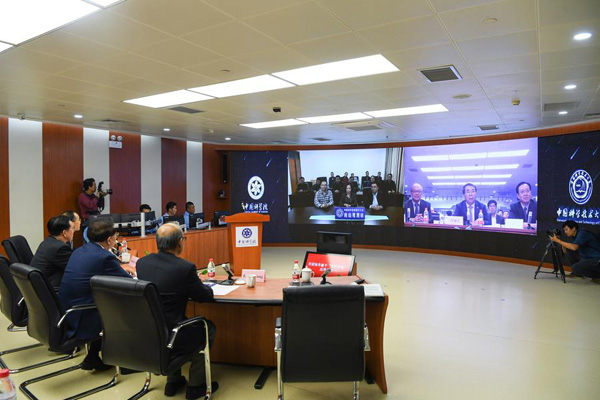Beijing-Shanghai quantum link a 'new era'
 |
|
Bai Chunli, president of the Chinese Academy of Sciences (CAS), talks with staff in the Urumqi ground station, in Beijing, capital of China, Sept 29, 2017. [Photo/Xinhua] |
China launched a 2,000-kilometer quantum fiber link connecting Beijing and Shanghai on Friday, allowing unhackable communication between the cities.
This is the world's longest and most sophisticated quantum link, and it will serve as the backbone connecting quantum networks in four cities: Beijing, Shanghai, Jinan in Shandong province and Hefei in Anhui province, said Pan Jianwei, China's leading quantum physicist.
During the link's launch in Beijing, Bai Chunli, the president of the Chinese Academy of Sciences, made video phone calls using the quantum link with scientists and government officials in Jinan, Hefei and Shanghai, congratulating them for their hard work.
Using Micius, the world's first quantum communication satellite, which was launched by China last year, Bai also made the world's first intercontinental quantum video call with Anton Zelinger, the president of the Austrian Academy of Sciences in Vienna, on Friday.
Micius has been integrated into the Beijing-Shanghai link, creating the world's first space-to-ground integrated quantum network capable of sending messages via landlines and from space, Bai said.
Zelinger said, "This begins a new era of international quantum communication.
"I would like to congratulate my Chinese friends in their achievements, and I hope other countries can follow and together build a global quantum internet," he added.
With these new developments, China can also vastly extend the distance of ultrasecured quantum communication, paving the way for further practical applications, said Pan.
During the event, two employees from the Bank of Communications completed a transaction from Shanghai to Beijing using the quantum link. The State Grid is also developing a managing application using a quantum link.
In the future, Chinese scientists will improve the stability of the quantum channel, improve quantum satellites' communication efficiency and stability during the daytime, and launch high orbit quantum communication satellites, said Pan.
"China will also cooperate with Germany, Russia, Italy, Singapore and other countries to explore the practicality of a global quantum communication network," he added. But for residential use, "it will still take around 10 to 15 years, after the cost has been reduced".
Quantum communication uses subatomic particles such as photons-the individual particles of light-to send data using quantum mechanics, said Nie Jiming, a quantum researcher at the CAS.
This communication is regarded as the most secure because these particles cannot be destroyed or duplicated and can detect eavesdroppers and alert authorities, he added.
"It will have great application in defense, finance, energy and other fields where security is paramount," he said.
In 2009, military officials used a quantum communication hotline to orchestrate the military parade for the 60th anniversary of the founding of the People's Republic of China.
In 2015, the Industrial and Commercial Bank of China used a quantum network to transmit data within Beijing, becoming the first Chinese bank to use the technology.
Given its potential, many countries, including the United States, Japan and the United Kingdom, are also racing toward quantum communication supremacy, but "I believe China will still lead the race in the next five years," said Pan.






















